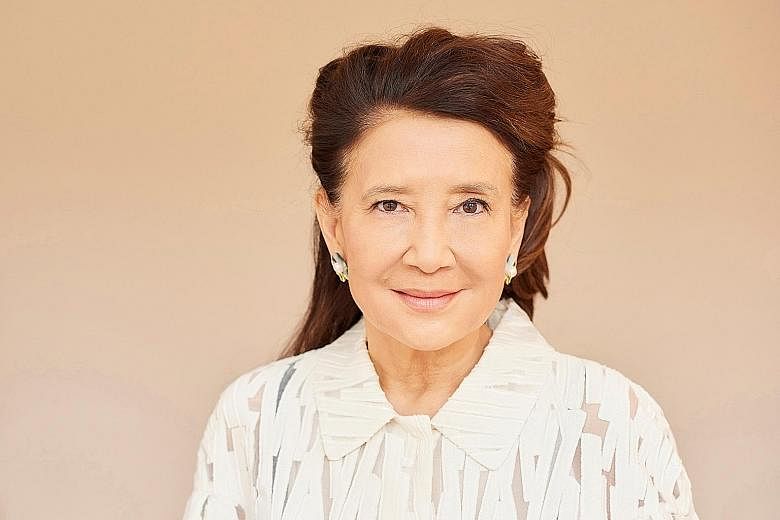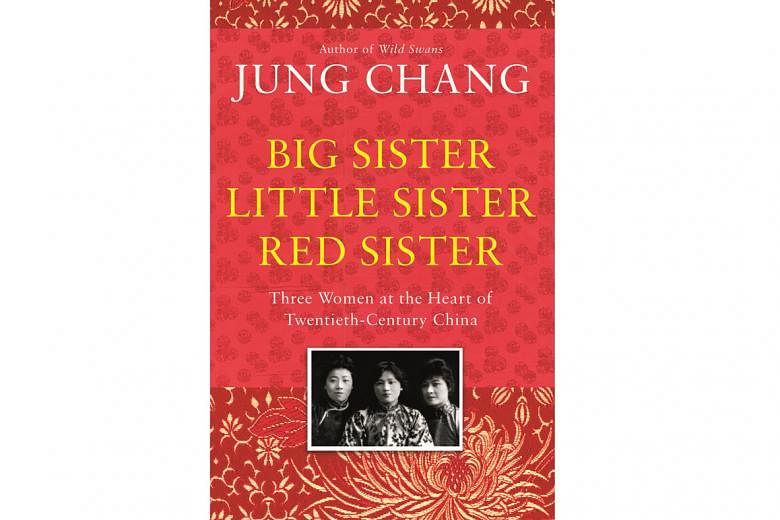In the Chinese-speaking world, everyone knew of the Soong sisters. Amid the political tumult of 20th-century China, they were at the centre of power. They were like a fairytale: one loved power, one loved money and one loved her country.
Or so people said of them. Historical writer Jung Chang decided she wanted to go beyond the myths and tell their stories as real people.
Her new biography, Big Sister, Little Sister, Red Sister follows Soong Ei-ling, Soong Ching-ling and Soong May-ling across a century.
Ching-ling married Sun Yat Sen, the politician who went on to be known as "the Father of China". After his death, she joined the Communists and rose to become their leader Mao Zedong's vice-chair, earning her the moniker, Red Sister.
May-ling, the youngest, wed Sun's successor, the Nationalist leader Chiang Kai-shek. Ei-ling, the eldest, became one of Chiang's closest advisers and made herself one of China's richest women in the process.
"Their lives were so dramatic," says Chang, 67, over the telephone from her home in London.
So many myths and rumours surrounded them, she recalls - that Madame Chiang would bathe daily in milk to keep her skin luminous, that Madame Sun was having an affair with her much younger bodyguard. "Through my research, I was trying to find out what the real Soong sisters were like."
Chang is most acclaimed for her bestselling family memoir Wild Swans (1991), a biography of three generations of women in her family, from her grandmother, a warlord's concubine, to her mother, who married a high-ranking officer in the Communist Party, to herself.
As a teenager during the Cultural Revolution, Chang joined the Red Guards but struggled with their brutal ways. Her parents were denounced and tortured for being critical of Mao, while she herself was exiled to the countryside for re-education. She later moved to Britain to further her studies and now lives there.
Wild Swans has sold more than 13 million copies and been translated into nearly 40 languages.
Chang later turned her pen to huge historical figures, writing Mao: The Unknown Story (2005), a more-than-800-page biography of Mao Zedong with her husband, Irish historian Jon Halliday, and Empress Dowager Cixi: The Concubine Who Launched Modern China (2013).
Chang's books are banned in China and she herself cannot travel there freely. It was considerably easier for her to research the Soong sisters, she says, because a lot of ground had already been covered in her work on Mao and Cixi and the sisters had all been educated in America, so there was a wealth of archival material on them there as well as in Taiwan.
There is some resonance between the life of her mother and that of two of the Soong sisters, in that they all had miscarriages because of the political lives of the men they married.
Chang writes in her book that Ching-ling miscarried after an attack on Sun's Presidential Palace. He escaped, leaving her in the compound to draw fire.
May-ling's miscarriage occurred after assassins broke into her bedroom to kill her husband. Her childlessness and the death of her mother plunged her into a long depression.
In an attempt to cheer her up, Chiang gifted her a "necklace" that was in fact an entire mountain near Nanjing. The "chain" comprised plane trees which he had imported from France, which in autumn would turn a different colour from the local trees, while the "pendant" was an emerald-green villa dubbed the "May-ling Palace". The "necklace" in its full glory can be viewed only from the air.
Chang's own mother miscarried in 1949 after she climbed a mountain to visit Sun's mausoleum, compounded by a 1,000-mile walk she and other party members undertook from Manchuria to Sichuan. Though Chang's father, a senior communist officer, had a jeep, her mother was new to the revolution and was forced to journey on foot to show her zeal.
Chang's mother, to whom Big Sister, Little Sister, Red Sister is dedicated, is now 88 and lives in Chengdu. Chang is allowed to visit her for just two weeks a year.
"I feel intensely sad about this, because she is dangerously ill," says Chang. "I wish I could be with her in the hospital by her bedside, but I can't. I live in dread that some day this privilege of visiting my mother will be revoked and I might never see her again."
Nevertheless, she intends to continue writing her books, however controversial the Chinese government may find them. "I think they know I am a writer of integrity," she says. "I am dedicated to telling the truth as I discover it. I will not bow to any pressure."
Though she feels repression in China has grown over the past few years and watched with trepidation as it marked the 70th anniversary of the People's Republic of China in September this year, she is optimistic about its future in the long run. "The door of the country has opened up so widely, it can't be closed again."



